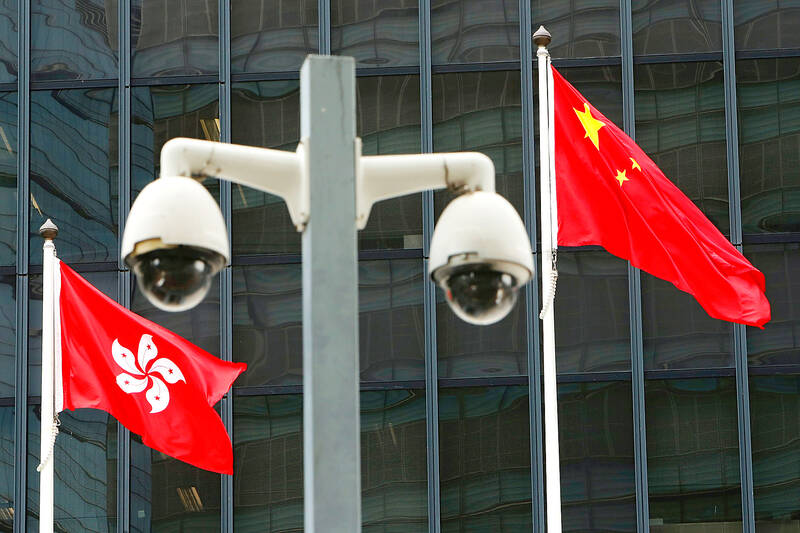The Mainland Affairs Council (MAC) has proposed amendments to laws governing cross-strait relations that would require all public servants to obtain prior approval to visit China, Hong Kong or Macau.
The proposed changes are part of efforts to implement President William Lai’s (賴清德) 17 national security strategies aimed at countering Beijing’s infiltration and influence operations, the council said.
Under the Act Governing Relations Between the People of the Taiwan Area and the Mainland Area (臺灣地區與大陸地區人民關係條例), only political appointees, personnel involved in national security, sensitive interests or confidential matters, and public servants at or above grade 11 in the selected appointment rank are currently required to obtain government approval before visiting China.

Photo: Reuters
Political appointees and personnel involved in matters of national security, sensitive interests, or classified information could be fined between NT$2 million and NT$10 million (US$66,825 to US$334,124) if they travel to China without prior approval from the Joint Review Committee.
Public servants at grade 11 or higher who fail to obtain approval from the Ministry of the Interior before visiting China could be fined between NT$20,000 and NT$100,000.
However, public servants ranked at grade 10 or below are currently exempt from these requirements and would be included via the amendments, the MAC said.
Although public servants are required under personnel regulations to notify their agencies before traveling to China, most agencies fail to enforce these rules or impose penalties, it said.
To strengthen oversight, the proposed amendments would strengthen the regulatory framework by bringing all public servants, regardless of rank, under the scope of the Act, the council said, adding that the criteria for penalties would be standardized.
To extend these regulations to public servants visiting Hong Kong or Macau, the council also proposed amendments to Article 10 of the Act Governing Relations with Hong Kong and Macau (香港澳門關係條例).
A Control Yuan report showed that 318 public servants had illegally traveled to China, including 55 senior officials and 263 junior personnel, it said.
However, the actual number of public servants who have visited China is likely higher, it said, citing cases in which street-level personnel travel without applying for leave, making it difficult for their agencies to track or record such trips.
Lai has said that information on government officials visiting China, “from administrative officials and lawmakers to local councilors and borough or village wardens,” should be open and transparent, the council said.
Therefore, the council would explore how to enhance management and disclosure of visits to China made by these democratically elected public servants, it said.
“Enhanced regulation would not ban them from traveling to China, but would disclose such information,” it said, adding that specific measures would be finalized by Premier Cho Jung-tai (卓榮泰).
Regarding Chinese residency permits, the Executive Yuan has said that military personnel, public servants and public-school teachers are prohibited from applying for or holding such permits.
However, there are no current restrictions on members of the general public, as Chinese law allows individuals to obtain a residency permit without registering household residency in China, meaning they can legally hold the permit without contravening Taiwan’s cross-strait regulations.
About 500,000 to 600,000 Taiwanese currently reside in China, including businesspeople, managers and students, the council said.
Given this reality, asking them to refrain from holding Chinese residency permits would be “unrealistic,” it added.

Nipah virus infection is to be officially listed as a category 5 notifiable infectious disease in Taiwan in March, while clinical treatment guidelines are being formulated, the Centers for Disease Control (CDC) said yesterday. With Nipah infections being reported in other countries and considering its relatively high fatality rate, the centers on Jan. 16 announced that it would be listed as a notifiable infectious disease to bolster the nation’s systematic early warning system and increase public awareness, the CDC said. Bangladesh reported four fatal cases last year in separate districts, with three linked to raw date palm sap consumption, CDC Epidemic Intelligence

Two Taiwanese prosecutors were questioned by Chinese security personnel at their hotel during a trip to China’s Henan Province this month, the Mainland Affairs Council (MAC) said yesterday. The officers had personal information on the prosecutors, including “when they were assigned to their posts, their work locations and job titles,” MAC Deputy Minister and spokesman Liang Wen-chieh (梁文傑) said. On top of asking about their agencies and positions, the officers also questioned the prosecutors about the Cross-Strait Joint Crime-Fighting and Judicial Mutual Assistance Agreement, a pact that serves as the framework for Taiwan-China cooperation on combating crime and providing judicial assistance, Liang

Reports of Taiwanese going missing, being detained or interrogated, or having their personal liberties restricted in China increased about fourfold annually last year, the Mainland Affairs Council (MAC) said yesterday. Last year, 221 Taiwanese who traveled to China were reported missing, were detained and interrogated, or otherwise had their personal freedom restricted, up from 55 the previous year, the council said. Reopening group tours to China would be risky, as it would leave travelers with no way to seek help through official channels after Beijing shut down dialogue between the associations tasked with handling cross-strait tourism, the MAC said. Taipei’s Taiwan Strait Tourism

SHIFT: Taiwan is evolving from a transit stop into a tourist destination, with more international travelers willing to spend on tours, dining and cultural activities Taiwan rose three places in the World Tourism Barometer to 36th globally in 2024, with international tourism revenue of US$10.028 billion, the Tourism Administration said on Monday. The UN Tourism Organization publication said that its focus has switched from whether a country has returned to pre-COVID-19 levels of tourism to the amount spent by a tourist during an overseas trip. The nation last year welcomed 8.57 million international tourists, about 9 percent more than in 2024, with most tourists coming from Japan, South Korea, and Hong Kong and Macau, all of which accounted for at least 1 million tourists each. During the first